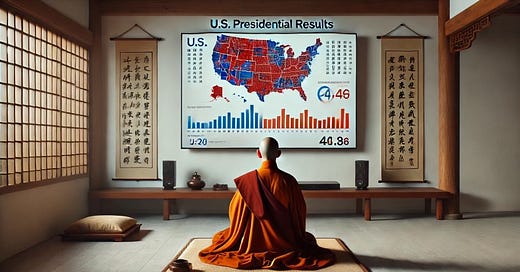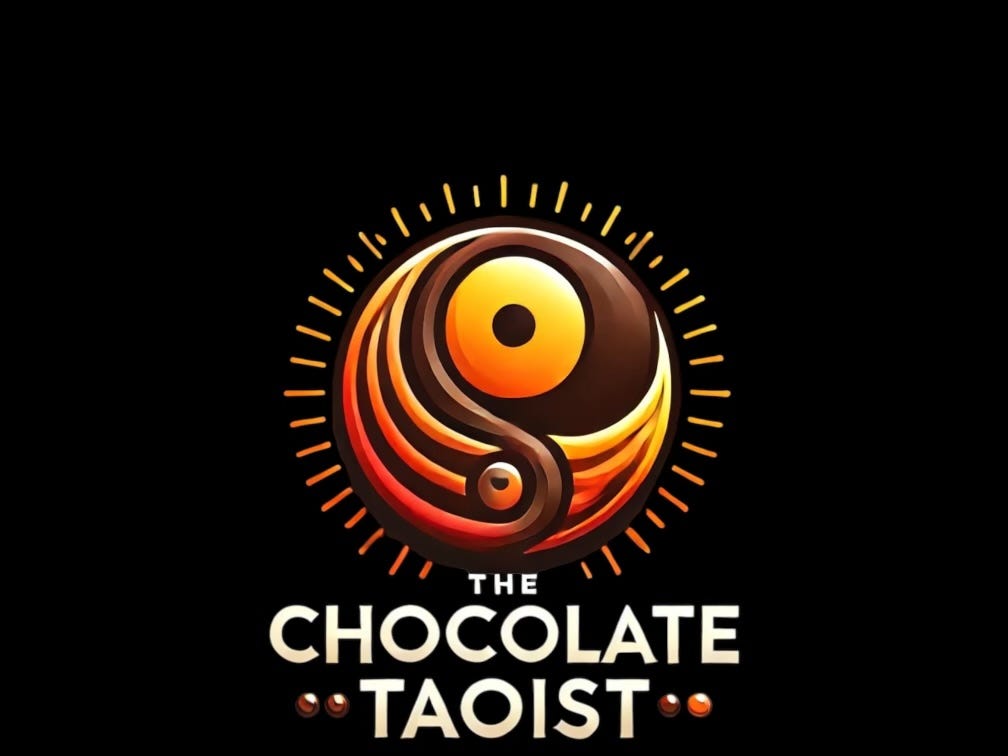Today’s toxic media landscape, headlined by a contentious presidential campaign can lead to a distorted sense of reality and disconnection from our inner selves.
The rise of social media, 24-hour news cycles, and the commodification of attention has turned the digital world into a battleground of competing narratives, algorithms designed to exploit our weaknesses, and content that thrives on our emotional triggers.
Amidst the noise, our mental health has become collateral damage, with feelings of anxiety, depression, and a perpetual sense of inadequacy impacting many of us.
In the face of this chaos, Lao Tzu’s ancient wisdom, rooted in the Taoist philosophy of simplicity, flow, and detachment, offers profound guidance on how to manage this environment and preserve our mental well-being.
His insights, drawn from the Tao Te Ching, call for a radical shift in how we engage with the world around us—a reminder to cultivate stillness, embrace natural rhythms, and detach from the unending pursuit of external validation.
The Nature of the Media Storm
The modern media ecosystem thrives on engagement which is often fueled by outrage, fear, and controversy, one where news headlines are crafted to provoke emotional responses.
Social media platforms are designed to encourage addiction-like behavior, drawing us in with endless feeds of content that simultaneously fascinate and repulse. We are bombarded with a thousand voices, each one clamoring for our attention, persuading us to react, comment, share, and repeat.
Lao Tzu would likely view this frenetic landscape as a manifestation of the imbalance and disorder that arises when human beings stray too far from their natural state of being. In Chapter 47 of the Tao Te Ching, he writes, “Without going outside, you may know the whole world. Without looking through the window, you may see the ways of heaven. The farther you go, the less you know.”
Here, Lao Tzu is cautioning us against overconsumption of external stimuli, suggesting that true understanding and wisdom come from within rather than from the tumultuous outside world.
Cultivating Inner Stillness Amid Outer Chaos
In Taoist philosophy, the concept of wu wei (non-action or effortless action) is central to maintaining balance in life. Wu wei is not about inactivity, but rather about aligning with the natural flow of the universe and responding to circumstances with calm and clarity, rather than with forced effort or emotional reactivity.
Applied to the media landscape, wu wei encourages us to be mindful of our consumption. Instead of allowing ourselves to be swept away by every new headline, tweet, or controversy, we can choose to step back, breathe, and observe before reacting.
Lao Tzu’s teachings remind us that in stillness, we find clarity. The constant barrage of information encourages a reactive mindset, one that thrives on division and conflict. In contrast, Lao Tzu would likely encourage us to cultivate inner stillness as an antidote to the chaos.
In Chapter 16 of the Tao te Ching, he writes, “Empty yourself of everything. Let the mind rest at peace. The ten thousand things rise and fall while the self watches their return.”
Here, Lao Tzu emphasizes the importance of emptiness and detachment—allowing the noise of the world to rise and fall without becoming entangled in it. By observing from a place of inner stillness, we create space to respond mindfully rather than impulsively.
Detachment from the Illusions of Social Media
A major source of distress in today’s media landscape is the illusion of perfection and success portrayed on social media. Platforms like Instagram and Facebook often present a curated version of life that distorts reality, leading many to feel inadequate or left behind.
Lao Tzu’s teachings offer a powerful remedy to this tendency. He frequently stresses the importance of humility, simplicity, and contentment with what is.
In Chapter 9 of the tao Te Ching, he writes, “Better stop short than fill to the brim. Over-sharpen the blade, and the edge will soon blunt. Amass a store of gold and jade, and no one can protect it. Claim wealth and titles, and disaster will follow.”
Lao Tzu warns against excess and the insatiable pursuit of material success or external validation, which mirrors the toxic cycle of comparison on social media. Instead, he advocates for simplicity, suggesting that true fulfillment comes not from chasing more but from being content with less—from recognizing that our worth is intrinsic, not tied to our online personas or external achievements.
Returning to Nature
Another essential element of Taoist philosophy is the belief that human beings are part of the natural world and should live in harmony with it. Lao Tzu often uses metaphors from nature to describe the ideal way of being.
He writes in Chapter 8, “The supreme good is like water, which nourishes all things without trying to. It is content with the low places that people disdain. Thus it is like the Tao.” This metaphor of water, which flows effortlessly, finds its own path, and nurtures without force, can be applied to how we navigate the media landscape.
Lao Tzu might suggest that instead of letting the media control our attention and emotional state, we learn to be like water—flowing through the landscape without becoming attached to it.
This means setting boundaries with our media consumption, recognizing when we are being manipulated by algorithms, and returning regularly to nature or practices that ground us. Whether through meditation, walks in the natural world, or time spent offline, reconnecting with the rhythms of nature helps us reclaim our equilibrium.
Practical Steps Toward Mental Clarity
To incorporate Lao Tzu’s wisdom into our modern lives and regain control over our mental health, we can take several practical steps:
💥 Limit Media Exposure: Set intentional limits on your media consumption. Choose specific times of day to check the news or social media, rather than allowing it to become a constant background presence.
💥 Practice Stillness: Incorporate daily practices of stillness and meditation to center yourself. These moments of quiet reflection allow you to process the information you’ve absorbed without becoming overwhelmed by it.
💥 Detach from Outcomes: In the face of toxic media, remember that your worth is not determined by the opinions of others or your engagement on social platforms. Practice detaching from the need for likes, comments, and external validation.
💥Cultivate Simplicity: Focus on the simple pleasures of life—human connection, nature, creativity—rather than the constant pursuit of more information or more validation.
💥 Be Like Water: Learn to flow through the media landscape without becoming attached to it. Know when to disengage and return to the grounding presence of nature, stillness, and self-awareness.
In a world that profits from our distraction, Lao Tzu’s wisdom offers a much-needed antidote: a path toward inner peace, mental clarity, and a life aligned with the natural flow of the universe.
By learning to disengage from the toxicity of the media, we can cultivate a deeper connection to ourselves and the world around us—one that is not dominated by the noise, but grounded in the quiet wisdom of the Tao.
💥 You can subscribe to my independent writing journey or tip me some coffeehouse love here. Your contributions are appreciated!






Beautiful, calming, positive, important material here!
These are all good tips, many of which I have learned to do over the years to live easier. I've always been a "political junkie" but it's become less and less fun over the past few years. Now I learn enough to stay engaged and motivated but without letting fear and anger from the media take over my life.